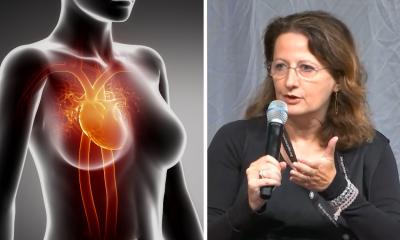Image source: Adobe Stock/eddows
Article • Women’s heart health
Exploring the cardiovascular impact of pregnancy and menopause
The critical times in a woman’s life of pregnancy and the menopause – and their relation to heart health – was explored in a special session at the European Society of Cardiology congress (ESC). With recognition that heart health treatment and care need to take into account gender-specific factors, the defined field of women’s cardiology is becoming an increasingly important area of focus.
Report: Mark Nicholls

Photo: supplied
‘Menopause is an important phase in women’s life, affecting changes in cardiovascular disease (CVD) risk factors, the immune system, thrombotic system and several others. The decline in Estrogens start from 30 years onwards and has a huge impact on fertility, CVD risk and many co-morbidities. These appear when women enter their forties, such as thyroid disorders and rheumatic diseases. Women with severe vasomotor symptoms are at higher CVD risk and often develop (early) hypertension. Menopause is therefore an important turning point in life and a good moment to assess an individual’s CVD risk,” said Professor Angela Maas.
Female-specific risk factors
Clinical cardiologist Maas, who is the author of “A Woman’s Heart – why female heart health really matters” and Chair in Cardiology for Women at the Radboud University Medical Center in Nijmegen, The Netherlands, said there are a number of key considerations for women during the menopause when it comes to heart health. ‘The shift in CVD risk factors is very important and also the consideration of other female-specific risk factors,’ she explained. ‘Migraine from puberty onwards and high blood pressure in pregnancy are other important female-specific risk factors that are often present in women with early menopause and many vasomotor symptoms.‘ She also points out that anginal symptoms in women at middle age are importantly caused by coronary spasm and not by stenoses.
Recommended article

News • Sex and gender bias
Beyond "bikini medicine": Should we redefine women's health?
A new study has found that women’s health research remains disproportionately focused on the reproductive years, with few articles on the major causes of illness and death in women.
Dedicated centres
‘The diagnosis is now easy in the cath lab, but still quite rarely done in too few centers,’ said Maas. ‘Many women walk around without a clear diagnosis and lack of treatment. This needs to change.’
With stress increasingly being a crucial risk factor in women, she said that nurses are important co-workers in the outpatient clinic to help women to learn to live with their symptoms. She advocates dedicated centres for women’s cardiovascular health to support better diagnosis and prognosis and believes women specific symptoms must be taken seriously, particularly for prevention. Maas emphasised that any comparisons of women’s symptoms with those of men is now an outdated approach.
Adverse pregnancy outcomes

Photo: supplied
In her presentation on pregnancy and heart health, Maggie Simpson, Lead Clinician with the Scottish Obstetric Cardiology Network, highlighted how CVD is a leading cause of maternal death and morbidity. ‘All healthcare professionals who engage with women of reproductive age with CVD have a role in reducing adverse pregnancy outcomes,’ she said. ‘Women of reproductive age can have pre-existing CVD, risk factors for CVD, and present with new CVD in pregnancy.’ She points out that adverse pregnancy outcomes, such as hypertensive disorders of pregnancy and gestational diabetes, are associated with CVD later in life.
Escalation of care
She said awareness of CVD in pregnancy among healthcare professionals is crucial and by recognising their pivotal role in provision of preconception care across a women’s reproductive years can lead to better outcomes.
Simpson, who is also Advanced Clinical Nurse Specialist at the NHS Golden Jubilee centre in Glasgow, said recognition of women with CVD can help identify those who may require preconception counselling from experts in CVD in pregnancy, facilitate access to contraception, and refer for follow-up with the Pregnancy Heart Team during pregnancy.
Following recognition of signs and symptoms of CVD presenting in pregnancy/postpartum, healthcare professionals can assess, investigate, make a diagnosis, and escalate care to senior members of the multi-disciplinary team.
Profiles:
Professor Angela Maas has been a clinical cardiologist since 1988. She has been Chair in Cardiology for Women at the Radboud University Medical Center in Nijmegen, The Netherlands, since 2012, where she focuses on the early identification of women at increased cardiovascular risk and stable and unstable ischemic heart disease in women at middle-age. As one of the most influential female doctors in Dutch healthcare, she was the 2020/21 Women’s representative of the Dutch Government to the United Nations.
Maggie Simpson is Lead Clinician with the Scottish Obstetric Cardiology Network and Advanced Clinical Nurse Specialist at the NHS Golden Jubilee University Hospital in Glasgow.
26.08.2022











